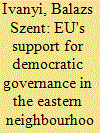| Srl | Item |
| 1 |
ID:
147692


|
|
|
|
|
| Summary/Abstract |
This article applies the Foucauldian premise of governmentality and the analytics of government framework to demonstrate how exclusive modalities of power – of the European Union (EU) and Russia – and their competing rationalities relate, intersect and become, counter-intuitively, inextricable in their exercise of governance over the eastern neighbourhood. This particular approach focuses on power as a process to gauge the prospects for compatibility and cohabitation between the EU and Russia. Using original primary evidence, this article contends that cohabitation between these two exclusive power modalities is possible and even inevitable, if they were to legitimise their influence over the contested eastern region. It also exposes a fundamental flaw in the existing power systems, as demonstrated so vividly in the case of Ukraine – that is, a neglect for the essential value of freedom in fostering subjection to one’s authority, and the role of ‘the other’ in shaping the EU–Russian power relations in the contested region.
|
|
|
|
|
|
|
|
|
|
|
|
|
|
|
|
| 2 |
ID:
133752


|
|
|
|
|
| Publication |
2014.
|
| Summary/Abstract |
The European Union seems to place an increasing rhetorical emphasis on harnessing the transition experience of the new member states. This article examines whether the EU actually makes use of this experience in its promotion of democratic governance in the eastern neighbourhood. The main conclusion is that while reform priorities of the EU in the region are aligned with transition experience, the actual participation of actors from the new members in implementing EU-financed projects aimed at promoting democratic governance is limited. This contradiction should be resolved or it will further erode the credibility of the EU's external policies.
|
|
|
|
|
|
|
|
|
|
|
|
|
|
|
|
| 3 |
ID:
164499


|
|
|
|
|
| Summary/Abstract |
The article and the special section aim to discuss and contextualise the recent rise of traditional aspects of geopolitics in EU foreign policy with a focus on the region on its eastern borders (that the EU has identified as its Eastern Neighbourhood) and Russia. Contributions evaluate the way recent events in the international arena (such as the Ukraine crisis, the Arab Spring or the rise of ISIS) have emphasised the need for the EU to engage with traditional aspects of geopolitics and strategic thinking in foreign policy. While, an initial reading of the EU’s recent development and behaviour in the Eastern Neighbourhood might point to the increasingly salience of traditional geopolitical considerations, the articles in the collection highlight that the hybrid nature of the EU also translates into its approach to geopolitics. Acknowledging that elements of traditional geopolitics are salient forces in world politics adds to the EU’s hybrid approach and has made it reframe its search for authenticity
|
|
|
|
|
|
|
|
|
|
|
|
|
|
|
|
| 4 |
ID:
153877


|
|
|
|
|
| Summary/Abstract |
Focusing on EU visa liberalization policy with Russia and Eastern Partnership countries as a case study, this article seeks to investigate the drivers of EU external migration policy in regards to its neighbourhood. In doing so, the article seeks to understand whether policy objectives and instruments employed by the EU emphasize security or normative considerations, or both. It also scrutinizes the factors behind this emphasis. In particular, it examines the degree to which EU external migration policy is framed by intra-EU bargaining and interaction with partner countries. The hybrid nature of EU visa policy towards its neighbourhood stems first and foremost from persisting differences in the prioritization of security and values among the major EU actors involved in the policy process. Yet as the article argues, interaction with partner countries crucially shapes the outcomes of the visa liberalization policy, thereby altering the balance between normative and security considerations that results from negotiations between EU actors.
|
|
|
|
|
|
|
|
|
|
|
|
|
|
|
|